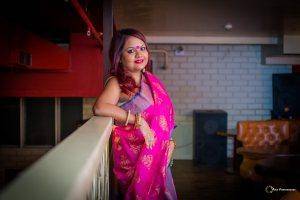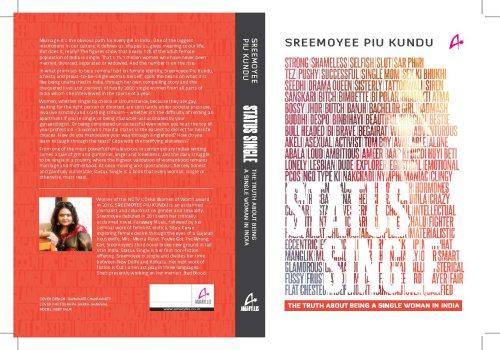Author of the book Status Single, Sreemoyee Piu Kundu, speaks at length with Aarti Pathak about 21 percent of the Indian population – the single women.
How many single women are there in India today?
There are 74 million single women in India today. They comprise 21 percent of our population and are growing at the rate of 39 percent annually. These numbers include unmarried women, divorced, widowed, separated, LGBTQ, disabled and women abandoned with or without kids.
Did you observe a common thread among the single women that you interviewed?
The common thread would be them standing on their own feet, their being self-reliant and living with dignity. Many women whom I spoke with are single out of choice, and didn’t want to succumb to the pressure of marrying by a certain age, didn’t want to compromise and marry just anyone. As opposed to what is portrayed in television and films, single women are not leading their lives pining away for a man or sleeping around with just about anyone. Companionship is something that everyone wants; but single women are definitely not just waiting for a Prince Charming. If they meet someone it is great, if not, then that’s fine too.
What is this ‘certain age’ that people keep talking about with respect to marriage?
It’s 30. When she turns 30 people think that she has turned 100!
Is there a golden age, when people realise that a woman really does not want to marry, give up on her and let her live in peace?
No, there isn’t. They keep telling her to marry till she turns 40 but after that they feel that she may as well rot and die. At 45, a different conversation begins around, “You are unmarried. Who will be by your side in your old age?” Related reading: Advantages and disadvantages of late marriages for women
What does 40 feel like to you?
I just turned 40 and feel fabulous. I feel empowered. A 40-year-old woman is more in control and can walk out of relationships faster without suffering the indecisiveness of her mind and body. Also, she won’t rush into a relationship for the sake of it. Having said that, I am all for companionship and equal partnership. I may notwant to marry someone today, but I’d love to have a companion – a lover who I can travel with, talk to, someone whose wavelength matches mine. But waiting for him is not the whole purpose of my existence. I am a daughter to my parents, a mother to a little girl we foster who is our househelp’s daughter, a friend, an author, a practicing Buddhist… there is a lot more to me as a person, just like there is to all the single women who spoke to me. Related reading: She has no regrets being single
What can be done to change our focus from a woman’s marital status to her as “a person”?
So many things at a micro level. It has to start from the family unit. Parents have to be educated and liberated and raise daughters to be capable individuals who grow up to stand on their own two feet. They must teach girls to live on their own, open and manage a bank account, handle jobs and responsibilities, buy a car on their own and manage the monthly EMIs and so on. When girls are given the wedding talk, they must be educated about the Indian legal system, as well; get them an appointment with a lawyer. She must know that her family is with her and so is the law of the country and that she must never put up with abuse or marital rape or violence. Even among women themselves, one notices that the conversations are about whether or not they have a man in their life. Women themselves have to start thinking of themselves beyond their relationship statuses. Women’s 40th birthdays are not celebrated the way elaborate weddings are. Indian designers spend a lot of energy on ostentatious wedding couture. But they could definitely invest more time in designing fabulous, comfortable clothing lines for working women/single mothers. Gender sensitisation workshops at workplaces and academic institutions can be integrated into the curriculum. Gynaecologists and doctors have to adopt a more grownup approach and treat patients for their medical ailments and not offer unsolicited marriage advice. More often than not, they end up talking like the neighbourhood jananis by giving lectures to everyone, specially to the single women. Also, parents must give their children space to be who they are. If the daughter does not want to marry, let her be. If she is polyamorous or transgender, again don’t force her to turn into something else. Arundhati Ghosh, the Executive Director of India Foundation of Arts, who is an advocate of polyamory and interviewed in the book says very rightly that when she speaks of polyamory, people only focus on sex/poly, and not amory which is love.
How do single men in India take their single status as compared to single women?
Not in the best possible manner. It is hard for them. Very few men talk about being single and the stereotyping, societal pressures and body shaming or the rejections they face in the marriage market. I do receive emails from single men, but by and large men don’t talk, as they are sucked into the vortex of a claustrophobic patriarchy. Women love to talk about sadness, breakup, heartaches and they all have their 2 am friends to vent and find support and solace in. But when a guy goes through a breakup, he is on his own most of the time. Even if he shares something with his male friends, they most probably will not be equipped to give him the kind of emotional support he needs. Most Indian men are not trained at all in emotional intimacy, because the focus on them growing up is to be a macho, masculine, tough, good looking man who is a provider and a 9 to 5 husband and father. They’re not comfortable with their own emotions (let alone the emotional needs of a woman in their life.) As there is no community outlet for men, they stay clammed up, pretend to be nonchalant. That leaves them further emotionally stunted and they end up believing that all that they need to fix things is sex. Tinder is full of heartbroken men waiting to be cured by getting into the pants of any woman, and married men who are cheating openly.
Coming back to women, where does this pressure to get married come from?
It is not just the single woman’s parents and the samaj to be blamed. It is the popular culture too. Every film, TV serial, song and book is about marriage and finding love. Nothing in popular culture speaks of single women and the ‘person’ they are or aspire to be. Everyone has to get married. There is hardly any film on single women. Even the recent Veere di Wedding (clearly inspired by Sex and the City), which is supposed to be ‘on single women’ is pegged as a ‘wedding film’. Once a woman gets married, soon follows the pressure to be a mom! God forbid, if a couple does not have children, the woman gets labelled baanjh.
You interviewed 3000 women. Is there one story that has stayed with you the longest?
They all left a mark on me… The story of transgender activist and single mother Gauri Sawant who rescued a baby girl from a red light area after her mother passed away due to AIDS, is one of them. A pimp was selling the child, but Gauri brought her home. Today the child goes to boarding school and is 14 years old and is getting proper education and a healthy life. This inspiring story was featured in the recent viral Vicks commercial. Currently Gauri is fighting for adoption rights for single transgender women.
If you had to say two things to single women in India, what would you say?
I’d say that this is not a single versus married debate. Finding companionship is a valuable part of one’s life, but never allow yourself to feel pressured to marry by a certain age or settle for a man who is not worthy. The only reason that one should marry is a ‘worthy companion’. Other than that, medical advances have made it possible for women to become mothers even much later in life. Secondly, always ensure that you have enough degrees or skills to be able to earn your own bread and butter. God forbid, if the husband passes away or the marriage falls apart, you should be able to support yourself. A lady whom I wrote about in my book, from Bengaluru, Shanthala Mruthyunjaya, lost her husband to an accident when she was in her early 20s. She had two children, in-laws to support and her parents and was not highly qualified, thanks to her early marriage that was abusive. After becoming a widow, she was forced to join the workforce to sustain her family under these hostile conditions. She started humbly by teaching English. Today she runs a soft skills training company that evens runs programmes for the Karnataka Government. What stories like these tell us is that women are capable of achieving anything and we must teach them to stand on their own feet right from childhood.
Do you think there’s been a positive shift in social perceptions? What gives you hope for the future?
Yes, however small, a positive shift is there. At the end of the day, we do have small steps that are in the positive direction. Women are marrying later. Women are single by choice. There are more single moms either adopting or even having a child by sperm donation or IVF. More disabled single women taking up jobs. Divorced women getting back to the workforce. Women are refusing to live in abusive marriages just for the sake of the child. They are working harder to be self-reliant. We have female SC Judges, fighter pilots, surgeons and so on… They are being recognised as individuals, professionals (beyond being defined as a certain man’s wife). Today, due to the advancement in science, women can conceive a baby through buying sperms. There are adoption laws that are proactive for older women adopting a child. Also, Indian laws are women friendly, they have been for a while and if a woman is going through abuse or harassment, the law is always right alongside her. Aarti Pathak From the Editorial Desk


